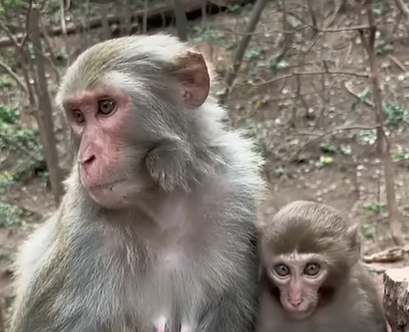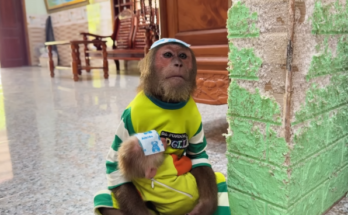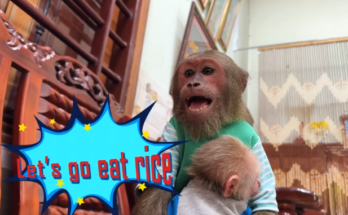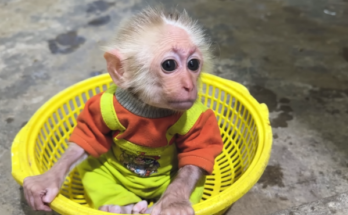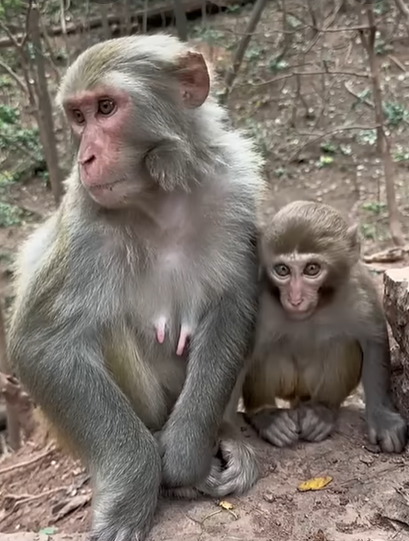
In the quiet canopy of the Indian forest, where birds sing the same songs their ancestors once did, and the leaves whisper tales of time, a young monkey sat clinging tightly to his mother. His hands, though larger than they were a year ago, still held on like a baby. His name was Mannu, and he was not quite ready to let go.
But his mother — Soma — had made a difficult decision.
She was abstaining from giving him milk.
To an outsider, it might seem like a minor moment in the vast, vibrant life of the jungle. After all, every mother eventually stops nursing her young. But to the jungle, and to Soma and Mannu, it was a quiet rite of passage, filled with emotion, struggle, and unspoken love.
The Natural Way of Things
Monkeys, like humans, live in close-knit families. The bond between a mother and her baby is sacred, often extending far beyond infancy. The mother carries the baby everywhere — feeding, grooming, protecting, teaching. For the first year or two of life, the baby is never alone. He clings to her chest as she leaps from branch to branch, trusting her completely.
But every monkey must eventually grow up.
In primate societies, there comes a time when the mother gradually reduces nursing. This is a biological and social necessity. The mother’s body must recover, her milk must dry up, and the baby must learn to fend for itself — to climb, to forage, to socialize. This process is called weaning.
For some baby monkeys, it’s a smooth transition. For others — like Mannu — it’s a heartbreaking change.
Mannu: The Adult Baby
Mannu wasn’t a baby anymore.
He was strong enough to leap across short branches on his own. His teeth were sharp, and he enjoyed chewing on tender leaves, bananas, and sweet tamarind pods. He could play rough games with the other young monkeys and had even started mimicking the adult males in mock dominance displays.
But when it came to his mother, he was still her baby.
He would climb into her lap and reach for her chest with wide, pleading eyes. He would whimper softly, curling his tail around her as if to say, Just one more time. And Soma — for months — had given in.
She understood his need. He had been a late bloomer, a shy monkey who struggled to separate from her even during play. She worried about him. She loved him. She wanted him to feel safe.
But she also knew something important: If she didn’t let go now, he might never learn to stand on his own.
The Decision
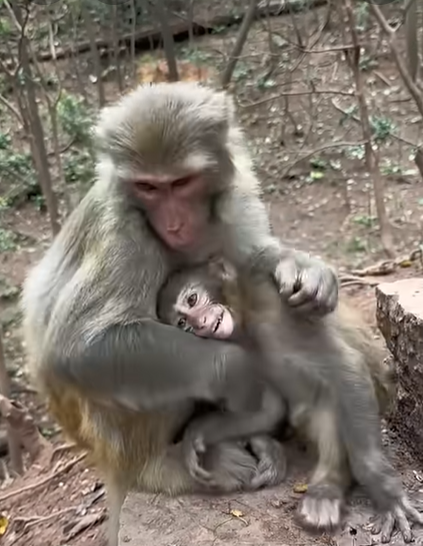
One morning, after grooming Mannu tenderly and watching him fall asleep curled against her side, Soma made her decision. From that day on, she would no longer allow him to nurse.
It wasn’t a punishment. It wasn’t rejection. It was love — tough, wild, necessary love.
The next time Mannu reached for her milk, Soma gently pushed his head away. He squeaked in surprise, tried again, more insistently. She held him, comforted him, but offered no milk.
He cried.
He threw himself on the ground, rolled, sulked, and refused to eat anything for the rest of the day. He followed her everywhere, tugging at her fur, but she stood firm. She groomed him as usual, slept beside him as usual — but her body was no longer his source of food.
The message was clear: You’re ready, Mannu. I believe in you. It’s time.
The Jungle Reacts
Other monkeys noticed the change.
Some mothers nodded with knowing eyes. They had been there — watched their own babies cry and flail, only to grow stronger in the end. The elder males ignored the drama, but the younger monkeys teased Mannu playfully, calling him “milk boy” and mimicking his whines.
Mannu hated it. But he also began to change.
Over the next few weeks, something inside him began to stir. Hunger pushed him to forage more aggressively. He discovered a patch of juicy berries that he kept as a secret treasure. He made a friend, a slightly older monkey who taught him how to crack open nuts using rocks.
He stopped crying for milk.
But he never stopped curling up next to his mother at night.
A Deeper Truth
To human ears, the phrase “Mother monkey is abstaining from mother’s milk for her adult baby monkey” might sound clinical — almost absurd. But in reality, it contains layers of wisdom and emotion.
It’s a story about:
- Boundaries in love: Soma’s decision wasn’t easy. In fact, it was heartbreaking. But setting limits was the most compassionate thing she could do. Real love often means stepping back, even when every instinct tells you to hold tighter.
- Growth through discomfort: Mannu didn’t grow by being coddled forever. He grew when he was forced to explore, to be uncomfortable, to find his own way.
- The universal journey of growing up: Across species, growing up is never easy. Whether it’s a toddler weaning off a bottle or a teenager moving out of home, the process is painful but necessary.
- Maternal wisdom: Soma’s abstaining wasn’t rejection. It was guidance. It was trust. She knew he was ready, even if he didn’t.
Reflections on Human Parallels
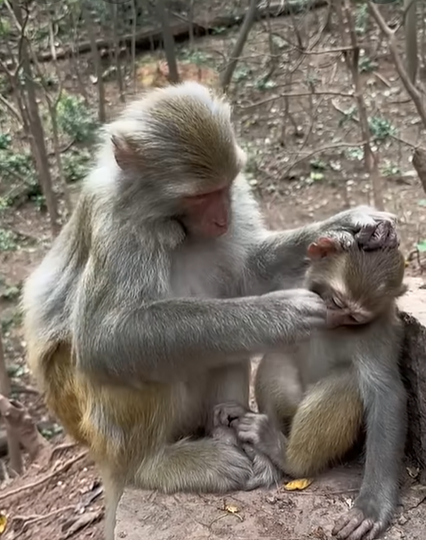
It’s easy to see a bit of ourselves in this story. The mother-child bond is one of the most powerful in all living creatures. But every relationship must evolve.
There comes a time when:
- A mother stops solving every problem for her child.
- A parent lets their kid fail so they can learn resilience.
- A teacher steps back to let the student lead.
- A friend says “you have to do this on your own now.”
And in those moments, the person pulling away is not being cruel — they’re saying: I see your potential. I know you can do this.
In the jungle, Soma knew her son had grown up. Not because he was ready — but because he needed to become ready.
Full Circle
Months later, Mannu was no longer the adult baby clinging to milk. He was independent, cheeky, and sometimes even protective of younger monkeys in the troop. He still sat next to his mother, still brought her fruit he found, still leaned into her warmth on cold nights.
But he no longer reached for her milk.
Soma watched him with pride, knowing that the hardest part of being a mother was not the sleepless nights or the constant protection — it was the moment when you had to stop being the source of everything and start being the quiet strength in the background.
Not feeding from the body anymore, but from the heart.
conclusion
“Mother monkey is abstaining from mother’s milk for her adult baby monkey.”
It’s a simple line, yet it holds a world of truth. It tells us that growing up is hard, letting go is harder, but both are necessary parts of love.
In the end, Soma didn’t stop being a mother when she stopped giving milk.
She became something even more powerful: a guide, a guardian, a quiet force of wisdom.
And Mannu? He didn’t lose his mother.
He found himself.
